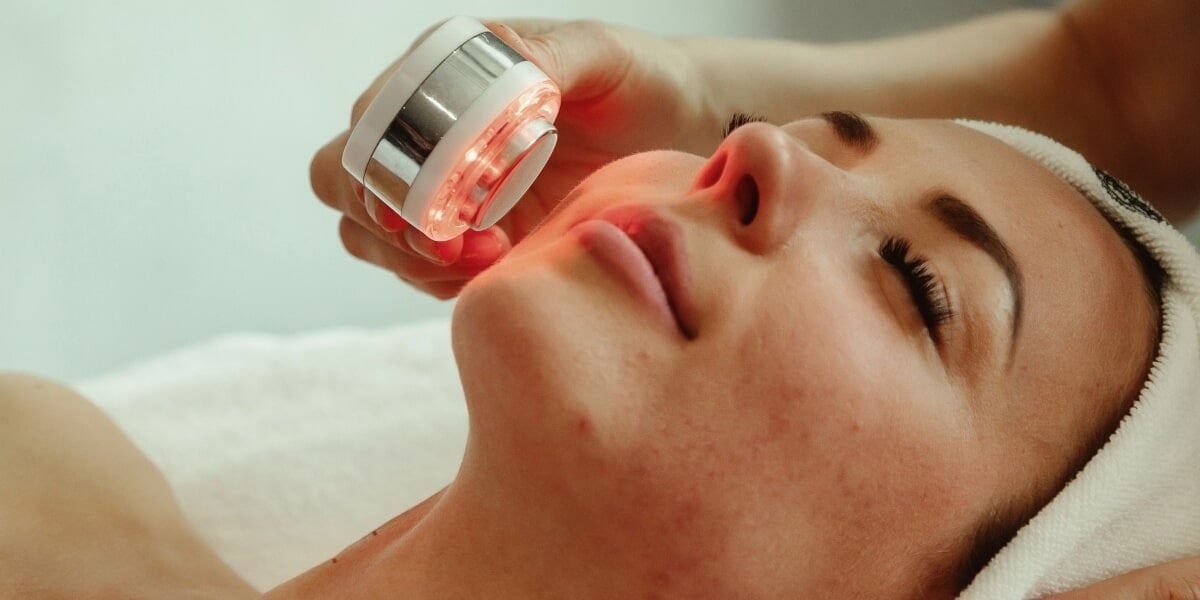What Is LED Light Therapy?
Light therapy uses the power of light energy to stimulate healing and other natural health processes. This non-invasive treatment can be used alongside other therapies to provide a full spectrum of care.
Also known as photobiomodulation therapy (PBMT), light therapy uses light to activate specific changes in your body. PBMT stimulates mitochondria, which you may remember are the “powerhouse” of cells. Mitochondria produce the ATP (adenosine triphosphate) that provides the energy cells need to function, repair themselves and reproduce.
The restorative powers of LED light therapy can help relieve chronic skin conditions, melt muscle aches and joint pain, and even erase visible signs of aging.
About the Light Used in LED Light Therapy
Light travels in waves, and some waves are longer than others. Scientists measure these wavelengths in nanometers (nm). Different wavelengths of light create different colors. Violet has the shortest wavelength at around 30 nm, while red has the longest at about 700 nm. Wavelengths of light measuring 600 nm to 1000 nm provide health benefits by penetrating the skin and triggering tissue changes.
Each wavelength, or color, penetrates the skin at different depths. Blue light affects only the topmost layer of skin, for example, while yellow light penetrates a bit further. Red light travels deeper into your skin, and near-infrared penetrates the deepest. Red and near-infrared offer the widest range of health benefits.
Different LED colors trigger specific responses. Blue light improves acne by slowing down oil production in the skin’s sebaceous glands. Red LED light therapy can reduce inflammation and stimulate the production of collagen, which is a type of protein that may improve symptoms of osteoarthritis and decrease joint pain. Collagen is also responsible for younger, healthier-looking skin.
How LEDs Work With Light Therapy
NASA developed light-emitting diodes (LED) for growing plants in space but found that these special lights could penetrate deep into the body to promote healing and human tissue growth. In the 1990s, the agency became interested in the benefits of using LED light therapy to promote the healing of wounds in their astronauts.
Today, LED light therapy is used by dermatologists, healthcare providers, and wellness specialists in doctor’s offices, healthcare centers, and spas.
Uses for LED Light Therapy
Healthcare professionals often use red light therapy to address skin conditions, such as:
- Wrinkles and other signs of aging
- Scars
- Wounds
- Sun damage
- Psoriasis
- Hair loss
- Acne
While red light therapy is good for treating skin conditions, the red light wavelengths penetrate deep into the tissue to treat conditions such as:
- Pain
- Inflammation
- Sore muscles
- Injuries
- Cold sores
- Cellulite and excess weight
- Cold sores
- Symptoms associated with carpal tunnel syndrome, osteoarthritis, and rheumatoid arthritis
Benefits of LED Light Therapy
LED light therapy provides many benefits.
Painless treatment
Unlike corticosteroid injections and some other standard treatments for arthritis or tendonitis that can temporarily worsen pain, LED light therapy is comfortable and completely pain-free.
No side effects
Aspirin, acetaminophen, and ibuprofen can cause side effects, especially if you use them for a long time. Cortisone injections can worsen the deterioration of your bones and joints. LED light therapy has no lasting or harmful side effects and zero recovery time following your treatment.
May be used alongside other treatments
Since LED light therapy has no side effects, you can combine it with physical and occupational therapy, diet, and exercise.
Versatility
LED light therapy effectively resolves pain and inflammation but also helps prevent injuries, heal wounds, treat acne and wrinkles, and even boosts your mood and sleep quality.
Device Quality & Dosage Are Key
Many LED light therapy devices are available today. Full-body red light therapy devices provide maximum exposure to the healing powers of LED light therapy, for example, while face masks and handheld units provide targeted treatment.
Not all LED light therapy devices are equal, though, and their differences can affect the quality of the treatment they provide. The highest quality devices combine several wavelengths to provide optimal effects, customizable treatments with Continuous Wave and Pulse Modes, and comfortable full-body light beds.
Dosage is also essential because everyone has different therapeutic needs and different responses to treatment. Most people enjoy optimal benefits from a 15-minute session three to five times a week for a few months, but a few individuals need longer or more frequent treatment sessions.
For more information about LED light therapy and its benefits, speak to a healthcare professional who is knowledgeable about red light therapy.

